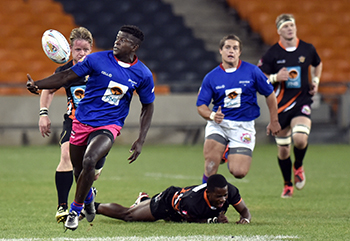Latest News Archive
Please select Category, Year, and then Month to display items
10 March 2022
|
Story Anthony Mthembu
|
Photo Unsplash
 The No Student Hungry team gearing up to start distributing food parcels to the selected students.
The No Student Hungry team gearing up to start distributing food parcels to the selected students.
The UFS is one of the many institutions of higher learning where food insecurity is an active issue. However, the
No Student Hungry Programme is one of the initiatives launched at the university to assist in fighting food insecurity at the institution.
The purpose of the programme
Since its inception in 2011, the initiative has assisted many students in acquiring a healthy meal. Additionally, the Food Environment Office also hands out food packages, so that students can continue to achieve academically. “We are trying to develop a healthy environment for students and make it easier for them to have a nice and healthy meal,” stated Annelize Visagie, who heads the Food Environment Office at the UFS. The Food Environment programme is spread out on all three campuses, each with its own facilitators. Furthermore, the programme mainly caters for students who are not funded by the National Student Financial Aid Scheme (NSFAS) but who are excelling academically. The abovementioned students apply for assistance online, and a list is then drawn up of students who receive assistance for the year.
Alternative solutions to keep the initiative running
On the Bloemfontein Campus, the No Student Hungry Programme will be catering for 200 students in the 2022 academic year, assisting them with a daily nutritious meal. Additional food parcels are also handed out to provide further assistance. “We give food parcels to the students on the list every Tuesday and Thursday at the Thakaneng Bridge,” Visagie highlighted. However, she argues that catering for the student population through this programme can be a challenge, as the demand for assistance is growing rapidly and the ability to assist is limited. The programme relies on partnerships and sponsors to assist the student body. In fact, the coordinators of the programme currently have a memorandum of understanding with Tiger Brands according to which they deliver around 100 food parcels for distribution.
In addition, the coordinators have put in place alternative measures to ensure that they can provide more food to students. “The
Kovsie Act Office, in partnership with the
Department of Sustainable Food Systems and Development, has started a food garden where healthy and nutritious produce are grown, in order to add value to the distribution,” she indicated. Although the programme can only assist to a point, students who are in desperate need of assistance are never turned away. In fact, the
Social Support Unit at Thakaneng Bridge usually assists students with food vouchers for a maximum of four days.
A commitment to teaching healthy eating habits
The programme is not only committed to curbing food insecurity, but also to ensuring that students have a healthy and balanced diet. As such, a booklet is being issued by the
Department of Nutrition and Dietetics in collaboration with the Department of Sustainable Food Systems and Development, which contains ways in which students can make a healthy meal using some of the ingredients offered in the food parcels.
“We want to teach students how to eat healthy in the cheapest way, because they don’t have a lot of money to buy expensive food products,” Visagie argued.
Mafuma aims at elusive tournament victory with Junior Springboks
2016-06-03

The University of the Free State’s Mosolwa Mafuma
recently scored five tries in the Junior Springboks’
three practice matches against a Golden Lions U20
invitation team, a Maties team, and the
South Western Districts. Photo: SASPA
He has never won a rugby tournament, so Mosolwa Mafuma has only one goal: to win the Junior World Cup as Junior Springbok in England.
Even though the 20-year-old Shimlas wing has achieved success, and it is pleasing to excel individually, he believes it is more satisfying when his team triumphs. According to Mafuma, who could just as well be an athletics star, he wants to help the South African U20 team take a different approach.
He and the prop Kwenzo Blose are players from the University of the Free State who will represent the Junior Springboks from 7 to 25 June 2016 in Manchester. The team will play the first of three group matches on 7 June 2016 against Japan in the Academy Stadium.
New approach for SA U20 team
Mafuma, who was Player of the Tournament in his first Varsity Cup in 2016, says the Junior Springboks are well prepared. “We have the skills, and the structures at the Junior Springboks are different than before. There is not just one game plan like playing with big guys. We want to try new things and have a different approach.”
It is with this team that he wishes to achieve something. “It is one thing to be able to say that you are the Player of a Tournament, but your team did not win. I have not won something at school (with St. Benedict’s Boys College in Johannesburg) or this year with the Shimlas.”
Speedster on athletics track
The speedster is one of only a few rugby players who also have a profile on the IAAF website. His fastest time in the 100 m is 10.37 seconds (a national U17 record) and 20.37 s in the 200 m.
In high school, this first-year Psychology student played rugby during winter and took part in athletics during summer. Only at the end of Grade 11 did he started focusing on rugby. “I was more of an athlete than a rugby player,” he says.
It is no coincidence that the nickname he acquired due to his speed, is Dash. His other nickname, Senkie (derived from the Afrikaans word ‘seuntjie’) he received as a child from his parents because he was such a small child.